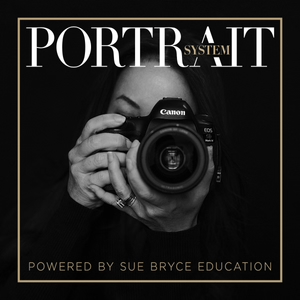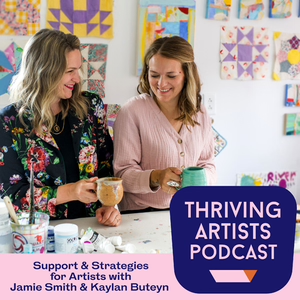
Nam June Paik: I Don’t Want to Be Over Whelmed by Glory
10/17/23 • 33 min
1 Listener
In the mid-1960s, Nam June Paik is living in a run-down studio in SoHo, struggling to make ends meet. But even as he jokes about his ongoing battle against cockroaches, he is building his network, seeking out support for his artist friends, and always experimenting with form. Paik’s vibrant personality is on full display in a letter from this period to musician David Tudor. Partially typewritten, partially handwritten, and full of wild punctuation and inside jokes, the letter’s main purpose is to help find work for his friend, Japanese musician Takehisa Kosugi.
In this episode of Recording Artists: Intimate Addresses, you’ll meet the wildly charming artist whose theories on technology and our relationship to it remain eerily prescient today; the man who coined the phrase “electronic superhighway” and advocated for artists to be at the vanguard of using the newest tech; and the person who tirelessly looked out for his friends. Host Tess Taylor unpacks some of Paik’s best-known artworks and traces his evolving thinking about art and tech. Anna Deavere Smith reads the letter. Korean American artist Sueyeun Juliette Lee and art historian and conservator Hanna Hölling help you make sense of Paik’s networks—both personal and electronic—and his legacy.
The Getty Patron Program is a proud sponsor of this podcast.
In the mid-1960s, Nam June Paik is living in a run-down studio in SoHo, struggling to make ends meet. But even as he jokes about his ongoing battle against cockroaches, he is building his network, seeking out support for his artist friends, and always experimenting with form. Paik’s vibrant personality is on full display in a letter from this period to musician David Tudor. Partially typewritten, partially handwritten, and full of wild punctuation and inside jokes, the letter’s main purpose is to help find work for his friend, Japanese musician Takehisa Kosugi.
In this episode of Recording Artists: Intimate Addresses, you’ll meet the wildly charming artist whose theories on technology and our relationship to it remain eerily prescient today; the man who coined the phrase “electronic superhighway” and advocated for artists to be at the vanguard of using the newest tech; and the person who tirelessly looked out for his friends. Host Tess Taylor unpacks some of Paik’s best-known artworks and traces his evolving thinking about art and tech. Anna Deavere Smith reads the letter. Korean American artist Sueyeun Juliette Lee and art historian and conservator Hanna Hölling help you make sense of Paik’s networks—both personal and electronic—and his legacy.
The Getty Patron Program is a proud sponsor of this podcast.
Previous Episode

Benjamin Patterson: Full Moon, Warm, Silver Clouds
On May 20, 1962, the morning after his first child is born, Benjamin Patterson writes a touching birth announcement to his own parents. The letter covers all the usual details—the baby’s weight and height, how the birth went, what the hospital is like—but its form is totally unique. Most of the letter is written in the voice of his newborn son, Ennis. Patterson, then a young, struggling musician and composer living as an American expat in Paris, shows off his creativity and experimental writing in this letter. He has been honing these skills making unusual musical scores for instruments, for paper, for bodies moving through a city.
In addition to marking a personal milestone, this moment coincides with a turning point in his career: four months after his son’s birth, Patterson will help launch the first festival of Fluxus, a loose collective of avant-garde artists. And shortly after that, he will move back to the US as he tries to find ways to support his family as an artist.
In this episode of Recording Artists: Intimate Addresses, you’ll trace Patterson’s move from classical bassist to Fluxus composer, and from his retirement from art at the height of his career to his return to music 20 years later. Host Tess Taylor unpacks the challenges Patterson faced as an artist, a father (the only parent featured this season), and a Black man in a largely white art world. Anna Deavere Smith reads the letter. Art historian julia elizabeth neal and musicologist, composer, and historian George Lewis contextualize the work, unusual career trajectory, and importance of this understudied artist.
The Getty Patron Program is a proud sponsor of this podcast.
Next Episode

Meret Oppenheim: Femme Fatale Is an Insult
In 1975, Meret Oppenheim’s small painting Würgeengel, or Angel of Death, is included in a sprawling exhibition organized by famous curator Harald Szeemann. She had painted it over 40 years earlier, when she was only 16 years old. The only problem now is that the curator has totally misunderstood her artwork—and placed it in a sexist context in the show. Rather than meekly accept this, Oppenheim writes Szeemann a deeply personal letter. Across five pages, she details the challenges she faced as a young woman who didn’t want children and was trying to make it as an artist in a heavily male sphere. Writing at age 63, Oppenheim speaks to burgeoning feminist ideals after decades of fighting back against sexist stereotypes.
In this episode of Recording Artists: Intimate Addresses, you’ll hear Oppenheim’s little-told story: an artist best known for lining a teacup in fur but who never stopped innovating, who socialized with the Surrealists as a teenager and kept a pistol in her studio to fight Nazis, and who took up the feminist cause towards the end of her career. Anna Deavere Smith reads the letter. Curator Bice Curiger, Oppenheim’s biographer, shares stories of Oppenheim’s life while artist Barbara T. Smith provides insight into the challenges facing women artists, particularly in the mid-20th century.
The Getty Patron Program is a proud sponsor of this podcast.
If you like this episode you’ll love
Episode Comments
Generate a badge
Get a badge for your website that links back to this episode
<a href="https://goodpods.com/podcasts/recording-artists-210735/nam-june-paik-i-dont-want-to-be-over-whelmed-by-glory-35013500"> <img src="https://storage.googleapis.com/goodpods-images-bucket/badges/generic-badge-1.svg" alt="listen to nam june paik: i don’t want to be over whelmed by glory on goodpods" style="width: 225px" /> </a>
Copy




